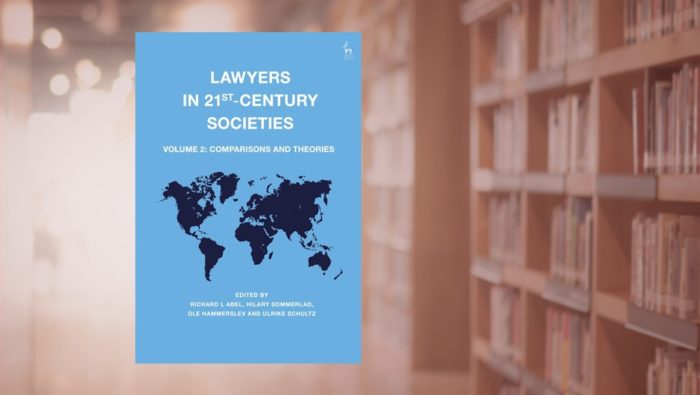
Lawyers in the 21st Century

As the former Chair of the International Working Group for the Comparative Study of the Legal Professions, which forms part of the Research Committee of the Sociology of Law, I was privileged to see the development of Lawyers in 21st Century Societies: Volume 2; Comparison and Theories edited by Richard L. Abel, Hilary Sommerlad, Ole Hammerslev, and Ulrike Schultz in real time, following on as it did from Lawyers in 21st-Century Societies Volume 1 National Reports. These prodigious works sought to build upon empirical evidence and debates that were comprehensively addressed in the 1980s by two giants of the Working Group, Richard Abel and Philip Lewis, in their three-volume Lawyers in Society. In doing so, the focus was expanded to consider a wider range of jurisdictions, in-keeping with the increasingly diverse membership of the Working Group and sister working groups. It also reconceptualises the legal professions’ roles and positionality in light of substantial shifts in contemporary societies. The chapters, authored by scholars from a wide range of disciplinary backgrounds and jurisdictions, provide a richness to our understanding. This extensive volume raises many additional questions in light of its broader and thus deeper coverage of themes through a comparative lens. As the best works do, it begs for further research to be undertaken.
Volume 2 begins by explaining the challenges of comparative method and methodology which pervades what is to follow. Systematic comparisons are always difficult across different legal cultures and traditions and the chapter ‘Studying Lawyers Comparatively in the 21st Century: Issues in Method and Methodology’ by Sommerlad and Hammerslev provides much food for thought for those considering comparative research in Socio-Legal Studies.
The volume is then divided into seven parts, each addressing a different theme. Part I considers the nature of comparisons in light of regions, religions, and political economies (Gómez, S. Dezalay, Künkler, Mrowczynski). These chapters provide the cultural contexts which shape and are shaped by the legal professions, including in relation to Latin America, Africa, the Islamic world, and post-socialist settings. Part II examines diversity in the legal professions, addressing issues within legal professions such as: gender inequality (Choroszewicz and Kay); men and masculinities (Collier); and race and ethnicity (Sommerlad, Melville, Hanson, Ashar, Deo and ter Voert). Part III considers the production of law and the production of lawyers including: fundamental questions in legal services regulation (Boon and Semple); when and why lawyers seek to influence law (Mather and Levin); globalisation and legal education (Hammerslev); and the casualisation of legal labour markets (Sommerlad, Hersant, Holvast, Verzelloni, Gustafsson, Sandefur and Clarke).
Part IV turns to lawyers and social justice, as agents of change and addresses lawyers and access to justice (Hunter, Olesen and Sandefur); cause lawyering in conflicted, authoritarian, and transitional societies (Bryson, McEvoy and Batesmith); human rights activists and their defence of the rule of law in Europe and Latin America (Lemke). Part V focuses on the place of multinational firms and the business of law including the evolution of large law firms (Gómez and Galanter); globalisation, lawyers, and the emerging economies of India, Brazil, and China (Wilkins, Trubek and Fong); and the rise of a regulatory Bar in Brussels (Avril).
Part VI addresses the sociology of professions examining the place of lawyers in this field (Liu); comparisons between accountants and lawyers (Aulakh); the mutation of medical professionalism (Exworthy and Moralee); and the potential for disruption by legal technology (Webb).
The final substantive section, Part VII, inquires into lawyers and state production providing a state-centred comparison of legal professions (Munger); the interconnected history of the internationalisation of national legal hierarchies (Y. Dezalay and Garth) and money laundering, corruption, and the legal profession (Levi). The final conclusion, by Abel, draws together the myriad of themes to sum up with an assessment of the comparative sociology of lawyers from 1988–2018. He argues that given the central importance of lawyers to the rule of law and a just society it is essential that we examine the role of lawyers effectively including the nature of the regulatory and governance systems in place to support the integrity of the profession(s). Further, he argues that the nexus between lawyers and the state is a close one and there is much to be studied here. The bidirectional relationship impacts upon access to justice, and the health of the rule of law, state structures, democracy, and the development of societies. He provides a series of research questions as a challenge to all researchers of the legal profession. A tour de force!
What does the reader learn from engaging with these twenty-six essays? We are provided with a nuanced understanding of the contemporary profession(s), in their diversity, complexity, professionalism, and business focus. We are given a new window into legal professional activism and professions’ abilities to strengthen or weaken the rule of law, depending on the ethics and values of those within the profession. We learn much about professions’ abilities to regulate and reflect on their role. By considering legal professions in African, Latin America, the Islamic world, and former communist states, alongside the more traditionally treated Common Law English speaking world, there is a distance from many of the much-discussed themes from the literature, allowing liminal insights in relation to our well-known jurisdictions at the same time as learning about those with which we have had less familiarity to date. I highly recommend the work to all interested in the legal professions, whether from a sociological or socio-legal perspective or otherwise.

